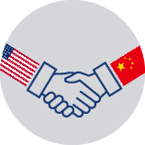US-China relations are built on a fragile web of complex issues. Recently, we’ve seen headlines about technology, sovereignty and human rights flare up, and the Phase 1 trade deal review has been delayed indefinitely. Here, I review these flashpoints and how they could affect US-China relations.
The Clean Network program
 US Secretary of State Mike Pompeo recently announced the Clean Network program. It expands beyond the Chinese telecom companies covered by the Clean Path initiative and covers carriers, stores, apps, cloud services and cables. So far, the program is light on details, but it does signal that banning Tik Tok and WeChat could be just the tip of the iceberg. It’s not clear what exactly will be prohibited and how the program would impact US-based companies operating in China. Given the scale, complexity, and likely unintended consequences of the program, we may not get more details until after the US elections in November.
US Secretary of State Mike Pompeo recently announced the Clean Network program. It expands beyond the Chinese telecom companies covered by the Clean Path initiative and covers carriers, stores, apps, cloud services and cables. So far, the program is light on details, but it does signal that banning Tik Tok and WeChat could be just the tip of the iceberg. It’s not clear what exactly will be prohibited and how the program would impact US-based companies operating in China. Given the scale, complexity, and likely unintended consequences of the program, we may not get more details until after the US elections in November.
Potential for escalation: China will likely wait for clarity before retaliating to this particular matter. If and when China does retaliate, it may decide to use the unreliable entities list, which is aimed at punishing firms deemed harmful to Chinese interests.
Taiwan/South China Sea
 Taiwan’s sovereignty and the South China Sea have historically been hot-button issues for US-China relations. On August 10, Health and Human Services Secretary Alex Azar visited Taiwan, making him the first US official to visit in six years and the highest-ranking official to visit since Washington severed diplomatic ties with Taiwan in 1979. China condemned Azar's visit and sent fighter jets across the median line of the Taiwan Strait, a significant and symbolic move. On August 26, China retaliated again with missile launches into the South China Sea. On the same day, the US added a further 24 companies to the restricted entities list for helping build outposts in the region.
Taiwan’s sovereignty and the South China Sea have historically been hot-button issues for US-China relations. On August 10, Health and Human Services Secretary Alex Azar visited Taiwan, making him the first US official to visit in six years and the highest-ranking official to visit since Washington severed diplomatic ties with Taiwan in 1979. China condemned Azar's visit and sent fighter jets across the median line of the Taiwan Strait, a significant and symbolic move. On August 26, China retaliated again with missile launches into the South China Sea. On the same day, the US added a further 24 companies to the restricted entities list for helping build outposts in the region.
Potential for escalation: Tensions in this area are likely to escalate. We don’t expect any actions with a high economic cost. But provocations could raise the risk of accident.
Phase 1 trade deal review
 A Phase 1 trade deal review meeting has been postponed, but progress has not been as bad as headlines suggest. We don’t think either side has a strong incentive to revoke the deal. China has made an effort to open up its financial sector and has stuck to currency rules. Agricultural progress has not been as bad as soybean imports suggest. China’s intellectual property reforms are underway, but the jury is still out on implementation.
A Phase 1 trade deal review meeting has been postponed, but progress has not been as bad as headlines suggest. We don’t think either side has a strong incentive to revoke the deal. China has made an effort to open up its financial sector and has stuck to currency rules. Agricultural progress has not been as bad as soybean imports suggest. China’s intellectual property reforms are underway, but the jury is still out on implementation.
Potential for escalation: We believe the deal is likely to remain intact, but implementation could fall off.
We see controlled escalation, for now
So far, China has responded to US provocations with similar measures. In other words, China generally meets sanctions with sanctions and tariffs with tariffs. As a result, we don’t expect tariff escalation, but we do expect controlled escalation in the areas of technology and Taiwan’s sovereignty. As US-China tensions continue to simmer, we believe the biggest risk is that one side will misinterpret the other side’s actions and escalate beyond the game of tit-for-tat we’ve seen thus far.

MALR025943




